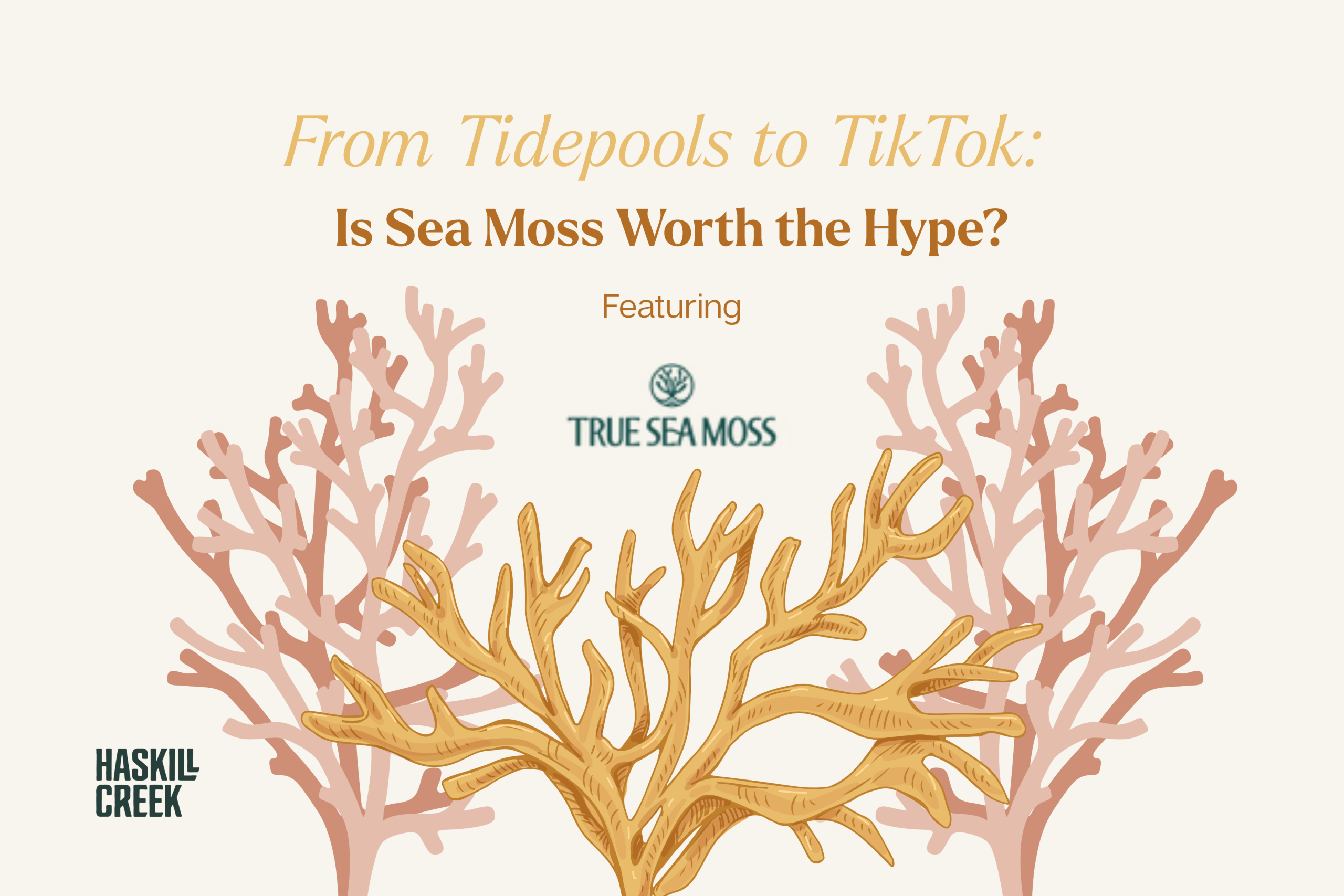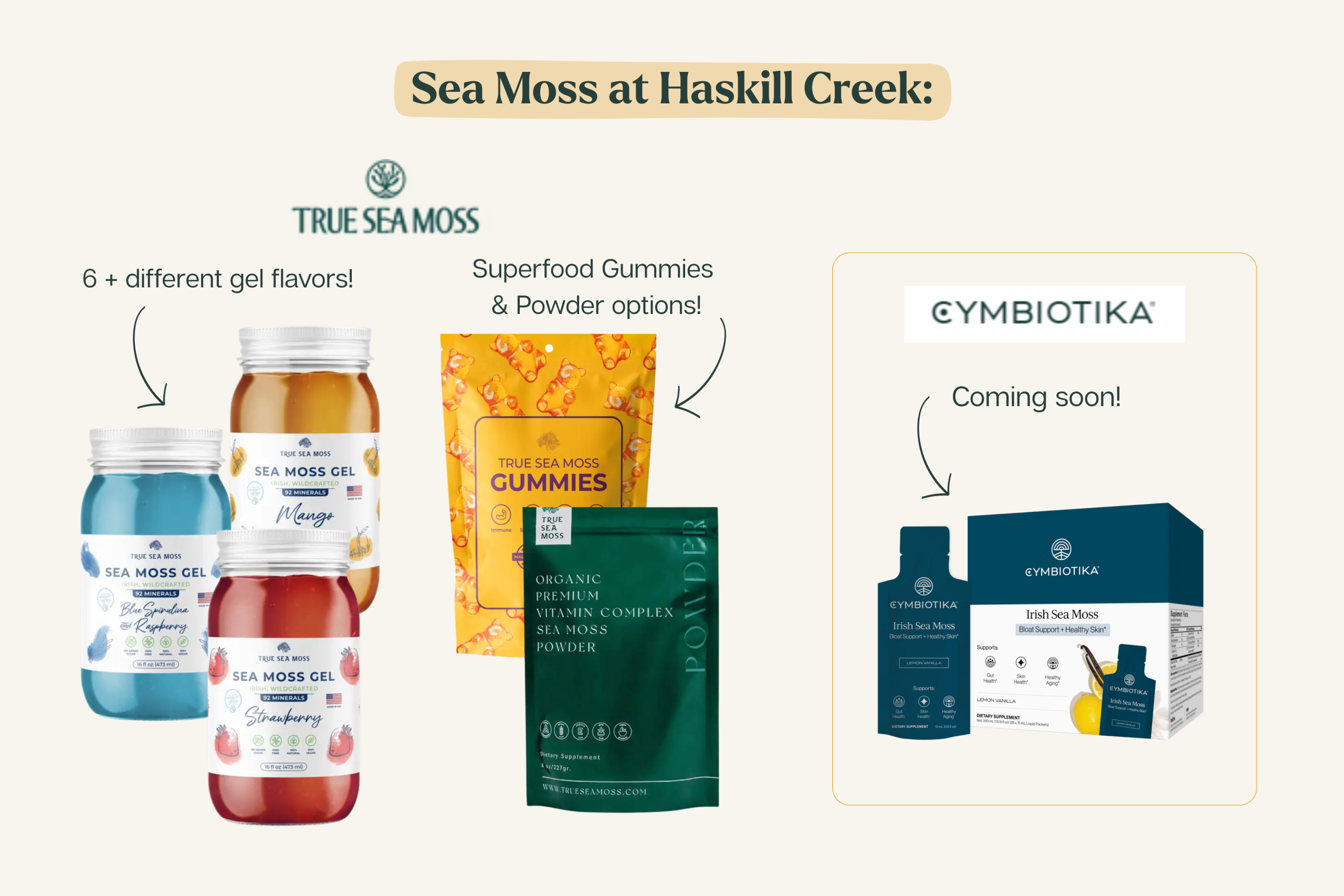Your Bag


A trending ingredient cropping up everywhere from smoothies to skincare- sea moss is making a splash as the latest superfood obsession.You’ve probably seen it on your social feed, with your favorite influencer touting its miraculous benefits. From glowing skin to immune boosting properties, being a nutritional superstar to helping keep trim- it seems to do it all. But does it, really? In this blog, I aim to break down the ‘science’ from the ‘science fiction’ and help you determine if sea moss is really worth the hype.
Sea moss, is also referred to as Irish moss, red algae, or its scientific name, Chondrus Crispus. It grows abundantly on both sides of the North Atlantic Ocean. Chances are, you’ve come across its extracted byproduct, carrageenan- which is often used as a thickener and commonly found on ingredient labels such as plant-based milks and dairy products.[1]
Sea Moss’s history is as rich and far-reaching as the ocean is deep. Archaeologists have estimated that this ocean dweller has been harvested for 14,000 years! It’s been consumed medicinally in China since 600 BC and was used to combat nutrient deficiencies during the “great potato famine” of the mid 20th century. [2]
What then, is so special about this sea vegetable? Seaweeds, in general, are considered nutrient-rich foods. They are a good source of:
With this diverse nutrient profile, seaweeds can be considered a new class of natural medicine called an “aquaceutical”. An aquaceutical is a bioactive product derived from aquatic organisms (such as algae, seaweed, or marine animals) that provides health benefits beyond basic nutrition. They often have properties that support:
Let’s explore each of these further.
1. Immune Function
Sea Moss contains minerals like selenium and zinc, as well as Vitamin C– which are naturally immune-supportive. Red Seaweed is also known to contain sulfated polysaccharides, or SPs, which have shown immune-modulating properties [4]
2. Thyroid Support
Sea moss is high in iodine, which is essential for thyroid hormone production. For those with healthy hormone function, this can be a helpful boost. However!
Caution is advised, as excessive iodine intake can lead to thyroid dysfunction. Those with thyroid disorders, on thyroid medications, are pregnant or nursing, should talk to their doctor before dabbling with adding sea moss to a daily regimen. Everyone should be mindful of recommended daily doses of sea moss to avoid excess iodine.
3. Anti-Inflammatory Effects
A study done in 2020 found that sulfated polysaccharides from red seaweed reduced inflammatory markers in macrophage cells. [5] Macrophages are a type of white blood cell that play a key role in our immune system. The study also further explored the synergistic combination of immunotherapy with chemotherapy for anti-tumor treatment.
4. Gut Health
Sea Moss contains polysaccharides, which act as prebiotic fiber. Several studies have shown their potential to act as prebiotics and to positively modulate the gut microbiota. [6]
5. Antioxidant/ Anti-Inflammatory/Antiviral Activity
The Phenolic Compounds found in sea moss act as antioxidants and reduce inflammation-related oxidative stress. These compounds are actually a sort of phytochemical produced from the sea plant as a defense against harsh conditions.[7] While Irish sea moss doesn’t contain as high a concentration of polyphenols as brown seaweeds, it does include important phenolic compounds like quercetin, gallic acid, and phlorotannins that contribute to its antioxidant and anti-inflammatory potential.
Much of the safety concerns surrounding sea moss lie in contamination issues. These stem from heavy metals present in the ocean or microbial growth from the harvesting and/or drying process. That’s why it’s important to opt for a brand that is 3rd Party Tested for purity. Enter why we chose to carry TrueSeaMoss! We think their dedication to quality stands out. Here are a few reasons why:

Overall, it seems the nutritional benefits of sea moss are legit. Certainly when it comes to vitamin and mineral content. However, more scientific studies need to be done to cement further claims of improved skin and hair, detox, or weight loss. Much of this is anecdotal evidence at this time. But there is no doubt that it is a superfood that deserves a spot in the current wellness landscape. So go ahead and sip that sea moss smoothie — from the tidepools straight to your Stanley tumbler.

Join to get the Haskill Newsletter and be the first to learn about new products, events, and other goings-on at Haskill Creek!
